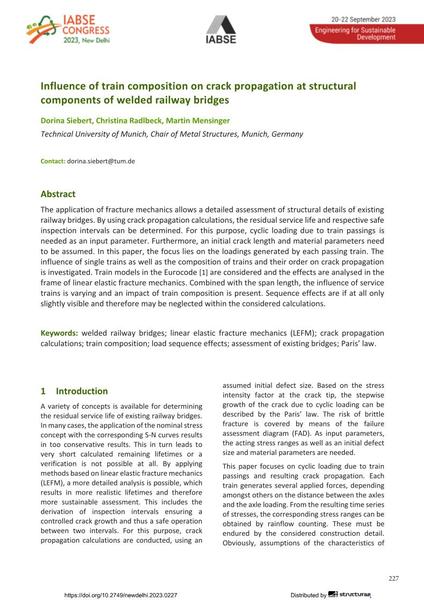Influence of train composition on crack propagation at structural components of welded railway bridges

|
|
|||||||||||
Bibliografische Angaben
| Autor(en): |
Dorina Siebert
(Technical University of Munich, Chair of Metal Structures, Munich, Germany)
Christina Radlbeck (Technical University of Munich, Chair of Metal Structures, Munich, Germany) Martin Mensinger (Technical University of Munich, Chair of Metal Structures, Munich, Germany) |
||||
|---|---|---|---|---|---|
| Medium: | Tagungsbeitrag | ||||
| Sprache(n): | Englisch | ||||
| Tagung: | IABSE Congress: Engineering for Sustainable Development, New Delhi, India, 20-22 September 2023 | ||||
| Veröffentlicht in: | IABSE Congress New Delhi 2023 | ||||
|
|||||
| Seite(n): | 227-235 | ||||
| Anzahl der Seiten (im PDF): | 9 | ||||
| DOI: | 10.2749/newdelhi.2023.0227 | ||||
| Abstrakt: |
The application of fracture mechanics allows a detailed assessment of structural details of existing railway bridges. By using crack propagation calculations, the residual service life and respective safe inspection intervals can be determined. For this purpose, cyclic loading due to train passings is needed as an input parameter. Furthermore, an initial crack length and material parameters need to be assumed. In this paper, the focus lies on the loadings generated by each passing train. The influence of single trains as well as the composition of trains and their order on crack propagation is investigated. Train models in the Eurocode [1] are considered and the effects are analysed in the frame of linear elastic fracture mechanics. Combined with the span length, the influence of service trains is varying and an impact of train composition is present. Sequence effects are if at all only slightly visible and therefore may be neglected within the considered calculations. |
||||
| Stichwörter: |
geschweißte Eisenbahnbrücken
|
||||
